01.01.02. Europako ekonomialariak Europan politika ekonomiko alternatibo baten alde (EuroMemo Taldea)
Fitxa multzoa
- Identificador (rico:identifier)
- ME_A 01.01.02.
- Tiene como tipo de agrupación documental (rico:hasRecordSetType)
- eu Azpisekzioa
- Título (rico:title)
- eu 01.01.02. Europako ekonomialariak Europan politika ekonomiko alternatibo baten alde (EuroMemo Taldea)
- es 01.01.02. Economistas Europeos por una política económica alternativa en Europa (Grupo EuroMemo)
- en 01.01.02. European Economists for an Alternative Economic Policy in Europe (EuroMemo Group)
- Tiene como acumulador a (rico:hasAccumulator)
- Economistas Europeos por una Política Económica Alternativa (EuroMemo Group)
- Baliabide klasea
- Record Set
Fitxak
-
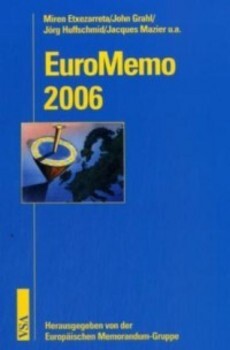 Kurztext: Das EuroMemo 2006 analysiert die wirtschafts- und sozialpolitischen Fehlentwicklungen und zeigt Alternativen auf. In weiteren Beiträgen werden einzelne Aspekte europäischer Politik analysiert. 50 Jahre nach Gründung der Europäischen Wirtschaftsgemeinschaft durch sechs Regierungen ist die EU mit mittlerweile 27 Mitgliedern in vielem zum Gegenteil dessen geworden, was den Bürgerinnen und Bürgern in den 1950er Jahren vorschwebte. Statt einer ökonomisch starken Friedensunion entwickelter Sozialstaaten bildet sich ein marktradikaler wirtschaftlicher Machtblock heraus, dessen Kennzeichen Massenarbeitslosigkeit, wachsende Ungleichheit und Aggressivität nach innen und außen sind. In einem derart unsicheren Umfeld besteht die Herausforderung darin, einen zuverlässigen Rahmen für eine stabile wirtschaftliche und soziale Entwicklung, ökologische Nachhaltigkeit und weltweite Solidarität bereitzustellen. Soucer: EuroMemo
Kurztext: Das EuroMemo 2006 analysiert die wirtschafts- und sozialpolitischen Fehlentwicklungen und zeigt Alternativen auf. In weiteren Beiträgen werden einzelne Aspekte europäischer Politik analysiert. 50 Jahre nach Gründung der Europäischen Wirtschaftsgemeinschaft durch sechs Regierungen ist die EU mit mittlerweile 27 Mitgliedern in vielem zum Gegenteil dessen geworden, was den Bürgerinnen und Bürgern in den 1950er Jahren vorschwebte. Statt einer ökonomisch starken Friedensunion entwickelter Sozialstaaten bildet sich ein marktradikaler wirtschaftlicher Machtblock heraus, dessen Kennzeichen Massenarbeitslosigkeit, wachsende Ungleichheit und Aggressivität nach innen und außen sind. In einem derart unsicheren Umfeld besteht die Herausforderung darin, einen zuverlässigen Rahmen für eine stabile wirtschaftliche und soziale Entwicklung, ökologische Nachhaltigkeit und weltweite Solidarität bereitzustellen. Soucer: EuroMemo -
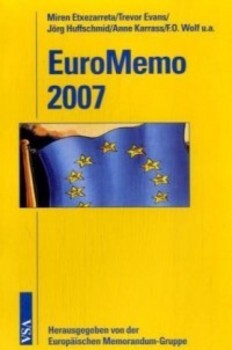 Herausgegeben von der Europäischen Memorandum-Gruppe 216 Seiten (2008) EUR 16.50 sFr 28.90 ISBN 978-3-89965-289-5 The full book can be downloaded here. Kurztext: Das EuroMemo 2007 der "Arbeitsgruppe europäischer WirtschaftswissenschaftlerInnen für eine alternative Wirtschaftspolitik in Europa" wird von mehr als 300 europäischen ÖkonomInnen unterstützt. Sie stellen in diesem Jahr folgende Vorschläge für eine andere Politik zur Diskussion: Um die Finanzkrise zu überwinden und Finanzstabilität in der EU herzustellen, sollten Sofortmaßnahmen gegen die Finanzspekulation mit Schritten zur Stabilisierung und zur Einbettung der Finanzsysteme in Europa in eine kohärente Entwicklungsstrategie verbunden werden. Eine aktivere gesamtwirtschaftliche Politik der EU sollte die Schaffung von mehr und besserer Beschäftigung und eine nachhaltige Entwicklung fördern. Öffentliche Dienstleistungen - oder "Dienstleistungen von allgemeinem Interesse" - müssen nicht nur rhetorisch, sondern auch durch die Politik als ein zentrales Element des europäischen Sozialmodells anerkannt werden, das auf Solidarität und Fairness beruht. Einen besonderen Schwerpunkt sollte die EU auf den Kampf gegen die Armut legen. Die Klima- und Energiepolitik sollte aktiver werden und konkrete Maßnahmen ergreifen, die den Wechsel von dem vorherrschenden fossilen zu einem nachhaltigen Energieregime befördern, das auf Energieeinsparung sowie der Entwicklung und dem Einsatz erneuerbarer Energieträger beruht. In ihren Außenbeziehungen sollte die EU das grundsätzliche Ziel verfolgen, einen tiefgreifenden Übergang zu einem Regime ausgeglichener und gerechter globaler Entwicklung zu fördern. Insbesondere sollte sie eine faire Handelsordnung für Zusammenarbeit und Entwicklung anstreben. Die HerausgeberInnen: Das EuroMemo, das von über 300 europäischen WirtschaftswissenschaftlerInnen unterstützt wird, wird herausgegeben von der Europäischen Memorandum-Gruppe. Inhaltsübersicht EuroMemo 2007: Vollbeschäftigung mit guter Arbeit, ein starker öffentlicher Sektor und internationale Zusammenarbeit - Demokratische Alternativen zu Armut und Unsicherheit in Europa Zusammenfassung Liste der UnterzeichnerInnen des EuroMemo 2007 Anne Karrass/Michaela Moser/Susanne Uhl/Diana Wehlau Armut und soziale Ungleichheit in der Europäischen Union Frieder Otto Wolf/Pia Paust-Lassen Vollbeschäftigung, Nachhaltigkeit und Solidarität - Europäische Energie- und Klimaschutzpolitik in globaler Verantwortung? Trevor Evans Die internationalen finanziellen Turbulenzen Trevor Evans/John Grahl/Jörg Huffschmid/Georges Menahem/Werner Raza/Jan Toporowski Die EU in der Welt
Herausgegeben von der Europäischen Memorandum-Gruppe 216 Seiten (2008) EUR 16.50 sFr 28.90 ISBN 978-3-89965-289-5 The full book can be downloaded here. Kurztext: Das EuroMemo 2007 der "Arbeitsgruppe europäischer WirtschaftswissenschaftlerInnen für eine alternative Wirtschaftspolitik in Europa" wird von mehr als 300 europäischen ÖkonomInnen unterstützt. Sie stellen in diesem Jahr folgende Vorschläge für eine andere Politik zur Diskussion: Um die Finanzkrise zu überwinden und Finanzstabilität in der EU herzustellen, sollten Sofortmaßnahmen gegen die Finanzspekulation mit Schritten zur Stabilisierung und zur Einbettung der Finanzsysteme in Europa in eine kohärente Entwicklungsstrategie verbunden werden. Eine aktivere gesamtwirtschaftliche Politik der EU sollte die Schaffung von mehr und besserer Beschäftigung und eine nachhaltige Entwicklung fördern. Öffentliche Dienstleistungen - oder "Dienstleistungen von allgemeinem Interesse" - müssen nicht nur rhetorisch, sondern auch durch die Politik als ein zentrales Element des europäischen Sozialmodells anerkannt werden, das auf Solidarität und Fairness beruht. Einen besonderen Schwerpunkt sollte die EU auf den Kampf gegen die Armut legen. Die Klima- und Energiepolitik sollte aktiver werden und konkrete Maßnahmen ergreifen, die den Wechsel von dem vorherrschenden fossilen zu einem nachhaltigen Energieregime befördern, das auf Energieeinsparung sowie der Entwicklung und dem Einsatz erneuerbarer Energieträger beruht. In ihren Außenbeziehungen sollte die EU das grundsätzliche Ziel verfolgen, einen tiefgreifenden Übergang zu einem Regime ausgeglichener und gerechter globaler Entwicklung zu fördern. Insbesondere sollte sie eine faire Handelsordnung für Zusammenarbeit und Entwicklung anstreben. Die HerausgeberInnen: Das EuroMemo, das von über 300 europäischen WirtschaftswissenschaftlerInnen unterstützt wird, wird herausgegeben von der Europäischen Memorandum-Gruppe. Inhaltsübersicht EuroMemo 2007: Vollbeschäftigung mit guter Arbeit, ein starker öffentlicher Sektor und internationale Zusammenarbeit - Demokratische Alternativen zu Armut und Unsicherheit in Europa Zusammenfassung Liste der UnterzeichnerInnen des EuroMemo 2007 Anne Karrass/Michaela Moser/Susanne Uhl/Diana Wehlau Armut und soziale Ungleichheit in der Europäischen Union Frieder Otto Wolf/Pia Paust-Lassen Vollbeschäftigung, Nachhaltigkeit und Solidarität - Europäische Energie- und Klimaschutzpolitik in globaler Verantwortung? Trevor Evans Die internationalen finanziellen Turbulenzen Trevor Evans/John Grahl/Jörg Huffschmid/Georges Menahem/Werner Raza/Jan Toporowski Die EU in der Welt -
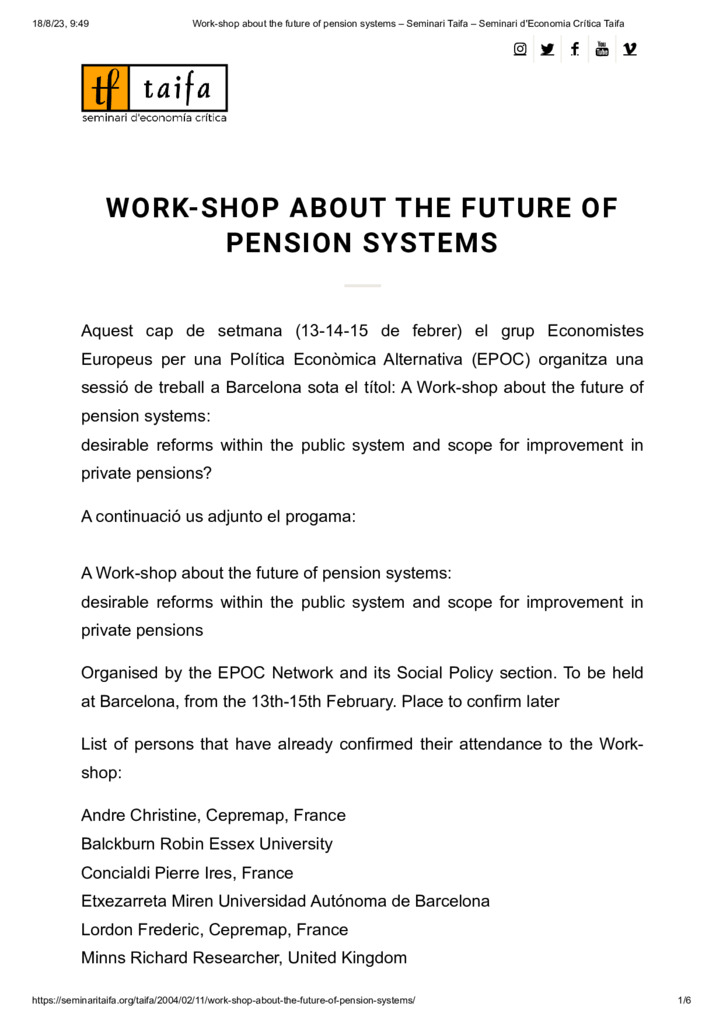 Aquest cap de setmana (13-14-15 de febrer) el grup Economistes Europeus per una Política Econòmica Alternativa (EPOC) organitza una sessió de treball a Barcelona sota el títol: A Work-shop about the future of pension systems: desirable reforms within the public system and scope for improvement in private pensions? A continuació us adjunto el progama: A Work-shop about the future of pension systems: desirable reforms within the public system and scope for improvement in private pensions Organised by the EPOC Network and its Social Policy section. To be held at Barcelona, from the 13th-15th February. Place to confirm later List of persons that have already confirmed their attendance to the Work-shop: Andre Christine, Cepremap, France Balckburn Robin Essex University Concialdi Pierre Ires, France Etxezarreta Miren Universidad Autónoma de Barcelona Lordon Frederic, Cepremap, France Minns Richard Researcher, United Kingdom Sawyer Malcolm University of Leeds Zubiri Ignacio Universidad del País Vasco, Spain The purpose of the Work-shop: For the last two years the EPOC group on Pensions has been analysing the strong trend towards privatisation of the public systems of pensions in the world and especially in the European Union and the will be- new members. Out of this work the group has concluded that the private systems are not better for the welfare of pensioners, the population in general and the functioning of the economy and society than the public systems, and that the danger of an economic crisis of the public systems is rather dubious and in any case much lighter than it is asserted and possible to counter if adequate measures are taken. Therefore it has come out clearly in favour of the maintenance of the public systems and against the development of private systems. The work-shop does not propose to come back to revise those arguments and counter arguments for the privatisation of pensions but considers that they have already been settled for the purposes of our work, therefore the objective of the Workshop is to advance towards the design of improvements of the present public pension systems. However it is recognised that the changes that are taking place in the labour market and in society require to be considered in relation with the public system of pensions if their functionality to increase the welfare of the populations and the efficiency of the system is to be maintained and improved. Because of it, it is considered that a revision of the existing proposals for improvement of the system and an ample debate about the nature and main features of the public pension systems and how to improve them in the future may be of social interest. Also, although the position of the Group is in favour of the reinforcement of the public systems, unfortunately this is not what is happening in our societies and private systems are being developed and expanded mainly under the orientation of public and private organisations that are more preoccupied by budgetary limits of the governments, expansion of financial markets or even only about greater profits for the financial institutions involved. It is considered here that it may be worthwhile too to discuss about the ways in which if private systems are developed they may be socially designed in order to defend and improve the interests of pensioners and stakeholders. We propose to devote the Work-shop to these two aims which are, of course, closely related. Methodology: The idea of the Work-shop is to provide an opportunity for informal discussion about the selected topics in order to advance towards building up some suggestions to improve the present pension systems, with the focus placed about securing the improvement and financial availability of the public pension systems. The plan of the meeting is to devote as much time as possible to discussion of the different issues. Thinking jointly and discussing the more relevant points may be more fruitful than presenting full papers. However, since some of the persons attending the meeting have proposed to present papers, at the Sessions more closely related to the themes of the proposed papers we could start with a short presentation of the papers as an introduction to the discussion. However, forgive me if I stress that we should not think in terms of formal Sessions for presentation of papers but devote most of our time to discussion and drawing of suggestions to improve the present pension systems. Even if a Coordinator is assigned to each session free discussion should be encouraged. Although an Agenda for the meeting is advanced we should consider it in a very flexible way and if we wish to devote more or less time than the proposed to a specific subject changes may be done. Also, although the names of Coordinators are given, please let me know if any of you prefer to coordinate a different Session. Agenda: Friday 13th. 17.00- 17.30: Arrival and welcome 17.30- 19.30 Session 1: Ideas to improve the present public pension systems. Ways in which the present public systems could be improved, from different view points: .. ways to improve and secure the financial availability of the public pension systems: improving the labour market, the scope to increase contributions, the role of taxation ? .. national situations and European convergence: desirability and/or possibilities of convergence of different European systems: establishing minimum or average norms around social/pension expenditure in relation with GDP, replacement rates: relation with wages, minimum wage or poverty levels? .. the special situation of the CEE countries There will be a short paper by P. Concialdi to introduce the subject Coordinator: Pierre Concialdi Saturday 14th 9.30- 11.30 Session 2: Labour markets and Pension systems. How can the public pension systems take into account the changes in the labour market (labour precariousness, new trends in labour careers, self-employment, shorter working lives?) How the efficiency of the present public systems may be improved. Social agents and the pension issue. The role of Unions. The reaction of workers to Pension Reform. Coordinator: Christine André 11.30-12.00 Pause 12.00- 14.00 Session 3: Labour based systems or citizenship based ones? Exploring the scope of citizenship based systems, their impact in society and labour markets, their requirements ( economic and social). May Basic Income be a substitute for pensions or it plays a different role? How to reconcile the egalitarian approach with a maintenance of standard of living approach? The economic requirements of Basic Income; the labour and social requirements. Coordinator: Miren Etxezarreta 14.00-16.00 Lunch 16.00-18.00 Session 4: Towards improvement of the private systems. Main shortcomings of the private systems: uncertainty, high costs, low rewards? The control of managers. The question of participation of pensioners: What type of participation? The problems of representation. Coordinator: Ignacio Zubiri 18.00- 18.30 Pause 18.30- 20.30 Session 5: Pensions are not only pensioners business. Pensions and the accumulation process: the weight of financial interests as limits to improvement of pensions systems. The European Union policies and the pension systems: impact of the Stability and Growth Pact and the building up of an European Integrated financial market in the possibilities of financing better systems. The macroeconomics of pension systems. New ways of financing pensions systems. The real costs of pension systems: fiscal rebates and subsidies (do we have any data about subsidies to private systems?If we had them it may be a good idea to bring them along to allow for more concrete discussions) Coordinators: M. Sawyer and R. Minns Sunday 15th 9.30-11.30 Session 6: Private systems as mechanisms for social participation. The debate about the scope to utilise pension funds as an instrument for social participation. Employees ownership: its possibilities, its risks, its deception. May employees ownership change the distribution of power and the social relations? There will be a paper by R. Blackburn, and it may be one by F. Lordon Coordinators: R. Blackburn and F. Lordon 11.30.12.0Pause 12.00- 14.00 Session 7: Conclusions and recommendations. We should end up with some proposals or at least with the identification of some further fields of work to advance in the desired direction. Coordinator: Miren Etxezarreta Barcelona, 30th January 2004
Aquest cap de setmana (13-14-15 de febrer) el grup Economistes Europeus per una Política Econòmica Alternativa (EPOC) organitza una sessió de treball a Barcelona sota el títol: A Work-shop about the future of pension systems: desirable reforms within the public system and scope for improvement in private pensions? A continuació us adjunto el progama: A Work-shop about the future of pension systems: desirable reforms within the public system and scope for improvement in private pensions Organised by the EPOC Network and its Social Policy section. To be held at Barcelona, from the 13th-15th February. Place to confirm later List of persons that have already confirmed their attendance to the Work-shop: Andre Christine, Cepremap, France Balckburn Robin Essex University Concialdi Pierre Ires, France Etxezarreta Miren Universidad Autónoma de Barcelona Lordon Frederic, Cepremap, France Minns Richard Researcher, United Kingdom Sawyer Malcolm University of Leeds Zubiri Ignacio Universidad del País Vasco, Spain The purpose of the Work-shop: For the last two years the EPOC group on Pensions has been analysing the strong trend towards privatisation of the public systems of pensions in the world and especially in the European Union and the will be- new members. Out of this work the group has concluded that the private systems are not better for the welfare of pensioners, the population in general and the functioning of the economy and society than the public systems, and that the danger of an economic crisis of the public systems is rather dubious and in any case much lighter than it is asserted and possible to counter if adequate measures are taken. Therefore it has come out clearly in favour of the maintenance of the public systems and against the development of private systems. The work-shop does not propose to come back to revise those arguments and counter arguments for the privatisation of pensions but considers that they have already been settled for the purposes of our work, therefore the objective of the Workshop is to advance towards the design of improvements of the present public pension systems. However it is recognised that the changes that are taking place in the labour market and in society require to be considered in relation with the public system of pensions if their functionality to increase the welfare of the populations and the efficiency of the system is to be maintained and improved. Because of it, it is considered that a revision of the existing proposals for improvement of the system and an ample debate about the nature and main features of the public pension systems and how to improve them in the future may be of social interest. Also, although the position of the Group is in favour of the reinforcement of the public systems, unfortunately this is not what is happening in our societies and private systems are being developed and expanded mainly under the orientation of public and private organisations that are more preoccupied by budgetary limits of the governments, expansion of financial markets or even only about greater profits for the financial institutions involved. It is considered here that it may be worthwhile too to discuss about the ways in which if private systems are developed they may be socially designed in order to defend and improve the interests of pensioners and stakeholders. We propose to devote the Work-shop to these two aims which are, of course, closely related. Methodology: The idea of the Work-shop is to provide an opportunity for informal discussion about the selected topics in order to advance towards building up some suggestions to improve the present pension systems, with the focus placed about securing the improvement and financial availability of the public pension systems. The plan of the meeting is to devote as much time as possible to discussion of the different issues. Thinking jointly and discussing the more relevant points may be more fruitful than presenting full papers. However, since some of the persons attending the meeting have proposed to present papers, at the Sessions more closely related to the themes of the proposed papers we could start with a short presentation of the papers as an introduction to the discussion. However, forgive me if I stress that we should not think in terms of formal Sessions for presentation of papers but devote most of our time to discussion and drawing of suggestions to improve the present pension systems. Even if a Coordinator is assigned to each session free discussion should be encouraged. Although an Agenda for the meeting is advanced we should consider it in a very flexible way and if we wish to devote more or less time than the proposed to a specific subject changes may be done. Also, although the names of Coordinators are given, please let me know if any of you prefer to coordinate a different Session. Agenda: Friday 13th. 17.00- 17.30: Arrival and welcome 17.30- 19.30 Session 1: Ideas to improve the present public pension systems. Ways in which the present public systems could be improved, from different view points: .. ways to improve and secure the financial availability of the public pension systems: improving the labour market, the scope to increase contributions, the role of taxation ? .. national situations and European convergence: desirability and/or possibilities of convergence of different European systems: establishing minimum or average norms around social/pension expenditure in relation with GDP, replacement rates: relation with wages, minimum wage or poverty levels? .. the special situation of the CEE countries There will be a short paper by P. Concialdi to introduce the subject Coordinator: Pierre Concialdi Saturday 14th 9.30- 11.30 Session 2: Labour markets and Pension systems. How can the public pension systems take into account the changes in the labour market (labour precariousness, new trends in labour careers, self-employment, shorter working lives?) How the efficiency of the present public systems may be improved. Social agents and the pension issue. The role of Unions. The reaction of workers to Pension Reform. Coordinator: Christine André 11.30-12.00 Pause 12.00- 14.00 Session 3: Labour based systems or citizenship based ones? Exploring the scope of citizenship based systems, their impact in society and labour markets, their requirements ( economic and social). May Basic Income be a substitute for pensions or it plays a different role? How to reconcile the egalitarian approach with a maintenance of standard of living approach? The economic requirements of Basic Income; the labour and social requirements. Coordinator: Miren Etxezarreta 14.00-16.00 Lunch 16.00-18.00 Session 4: Towards improvement of the private systems. Main shortcomings of the private systems: uncertainty, high costs, low rewards? The control of managers. The question of participation of pensioners: What type of participation? The problems of representation. Coordinator: Ignacio Zubiri 18.00- 18.30 Pause 18.30- 20.30 Session 5: Pensions are not only pensioners business. Pensions and the accumulation process: the weight of financial interests as limits to improvement of pensions systems. The European Union policies and the pension systems: impact of the Stability and Growth Pact and the building up of an European Integrated financial market in the possibilities of financing better systems. The macroeconomics of pension systems. New ways of financing pensions systems. The real costs of pension systems: fiscal rebates and subsidies (do we have any data about subsidies to private systems?If we had them it may be a good idea to bring them along to allow for more concrete discussions) Coordinators: M. Sawyer and R. Minns Sunday 15th 9.30-11.30 Session 6: Private systems as mechanisms for social participation. The debate about the scope to utilise pension funds as an instrument for social participation. Employees ownership: its possibilities, its risks, its deception. May employees ownership change the distribution of power and the social relations? There will be a paper by R. Blackburn, and it may be one by F. Lordon Coordinators: R. Blackburn and F. Lordon 11.30.12.0Pause 12.00- 14.00 Session 7: Conclusions and recommendations. We should end up with some proposals or at least with the identification of some further fields of work to advance in the desired direction. Coordinator: Miren Etxezarreta Barcelona, 30th January 2004 -
Correspondencia interna del grupo EuroMemo del año 2001. Contiene correos electrónicos, listado de participantes, documentos para la petición de fondos europeos de Miren Etxezarreta. Incluye documentos parciales de trabajo del grupo
-
Documentación relacionada con la reunión de septiembre del 2001 en Bruselas. Contiene: informes de las reuniones, y documento final del 27 febrero del 2002 "The evolutions of the social state in ten European countries. What convergence?"
-
Documentación relacionada con la reunión en marzo del 2002 en Bremen. Contiene programa, correos electrónicos, lista de participantes. Resumen de la reunión y notas de Miren Etxezarreta
-
Documentación relacionada con la reunión en junio del 2002 en Barcelona. Contiene correos electrónicos, presentación de la reunión, notas manuscritas de Miren Etxezarreta. Incluye documento "Las reformas de pensiones en América Latina y Europa Oriental - Contexto, conceptos, experiencias prácticas y enseñanzas", Katharina Müller (2003)
-
Documentación relacionada con la reunión en marzo del 2003 en Budapest. Contiene correos electrónicos, notas manuscritas de Miren Etxezarreta y documentos de trabajo.
-
Documentación relacionada con la reunión en junio del 2003 en Viena . Contiene correos electrónicos, presentación de la reunión, notas manuscritas de Miren Etxezarreta. Incluye documentos de trabajo
-
Documentación relacionada con la reunión en septiembre del 2003 en Bruselas. Informe de la reunión, planificación de trabajos, correos electrónicos, notas de Miren Etxezarreta
-
Documentación relacionada con la reunión en febrero del 2004 en Barcelona. Contiene correos electrónicos, notas manuscritas de Miren Etxezarreta, lista de participantes y documentos de trabajo.
-
Informes de EuroMemo. Contiene informes del grupo con algunas notas de Miren Etxezarreta. "After the French and Dutch No to the Constitution: The EU needs a new economic and social development strategy", 2005 "Pleno Empleo con trabajo digno, Servicios Públicos potentes y cooperación Internacional. alternativas democráticas a la pobreza y a la precariedad en Europa", 2007 "The Subordination of European Finance" John Grahl, 2009 "Alternative economic policy in Europe", 2010 "Boom and (deep) crisis in the Spanish economy: the role of the EU in its evolution", Miren Etxezarreta, Francisco Navarro, Ramón Ribera, Victòria Soldevila, 2011 "Boosting the crisis. A response to the European roundtable of industrialists" "The deepening crisis in the European Union: the need for a fundamental change" 2013 Incluye articulo "El sector público y la politica fiscal", Economia política, Juan Torres López, 2005
-
Documentación personal de Miren Etxezarreta y listado de participantes en Workshop Foto de grupo EuroMemo en septiembre del 2009 en Berlin con listado de participantes Premio "First degree team a ward given by the rector of the Pozznan University of Economics" for original anda crative scientific achievements in tehe academic year 2013/2014 for the monograph entitled: "The Deppening Crisis of the European Union The case for Radical Change. Analyses and Proposals from the EuroMemo Group" List of participants of the RLS Workshop 16-17.12. (-18.12.) con nota de Miren: "Articulos sobre la UE" "una sortida justa i intel-ligent de la crisi" Workshop, Barcelona 20 de mayo 2014. Listado de participantes con breve biografía en ingles.
-
Documentación de EuroMemo sobre pensiones y textos de Miren Etxezarreta. Contiene informes y presentaciones de Miren Etxezarreta. "The European Union proposals for the Public Pension system", 2002 "The drive towards pension privatisation - What is at stake?, Miren Etxezarreta, 2003 "Privatisation of public pension systems - forces, experience, prospects", Miren Etxezarreta, 2003 "La política social de la UE", Miren Etxezarreta, 2002 "La política social de la Unión Europea: Consideración especial del sistema de pensiones", Miren Etxezarreta , 2002 Transparencias sobre Política Social UE, Reunión Bilbo 2004
-
Documentación relacionada con conferencias sobre "Full Epolyment in Europe" de EuroMemo en mayo de 1999 en París, y en septiembre del 2000 en Brussels . Contiene 1999. Listado de participantes, agenda, , notas de Miren Etxezarreta y recortes de prensa, "About the concept os full employment: a limited 'survey'" de Miren Etxezarreta 2000. Material Network 1 fase final, documentación enviada para la reunión anual de EuroMemo en octubre en Bruselas.
-
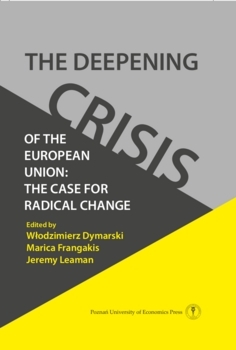 17th Workshop on Alternative Economic Policy in Europe, 16-18 September 2011 at the C3-Center for International Development, Vienna / Austria, organised by the EuroMemo Group
17th Workshop on Alternative Economic Policy in Europe, 16-18 September 2011 at the C3-Center for International Development, Vienna / Austria, organised by the EuroMemo Group -
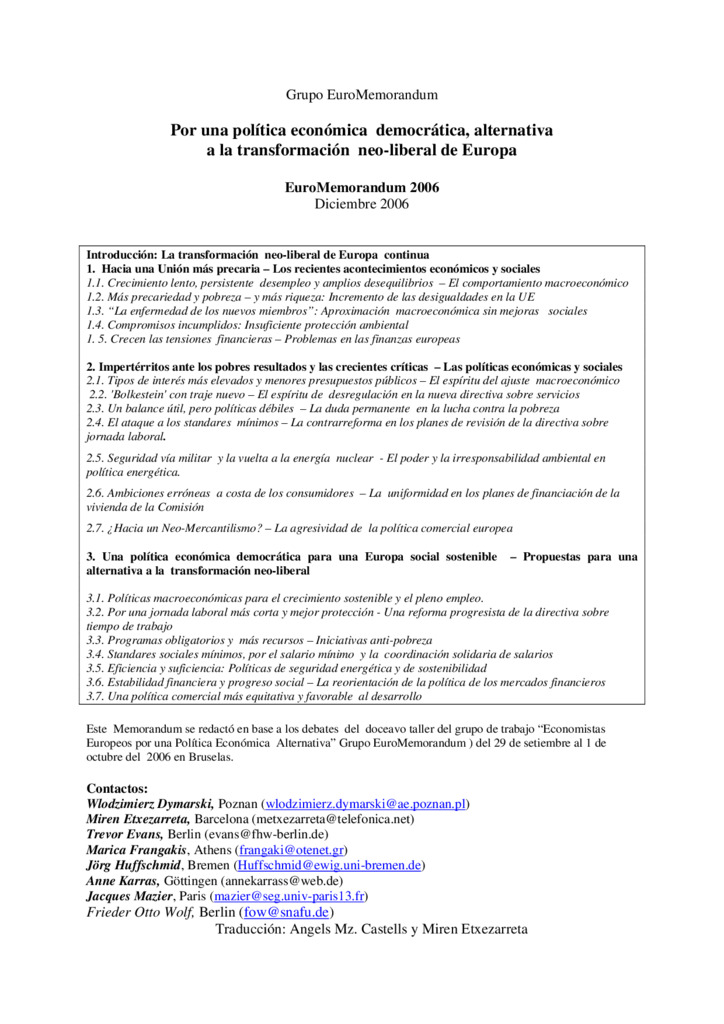 This Memorandum was formulated on the basis of discussions at the 12th workshop of the working group "European Economists for an Alternative Economic Policy” (EuroMemorandum Group) on September 29 - October 1, 2006 in Brussels. The text is available in English, French, German, Greek, Hungarian, Polish and Spanish.
This Memorandum was formulated on the basis of discussions at the 12th workshop of the working group "European Economists for an Alternative Economic Policy” (EuroMemorandum Group) on September 29 - October 1, 2006 in Brussels. The text is available in English, French, German, Greek, Hungarian, Polish and Spanish. -
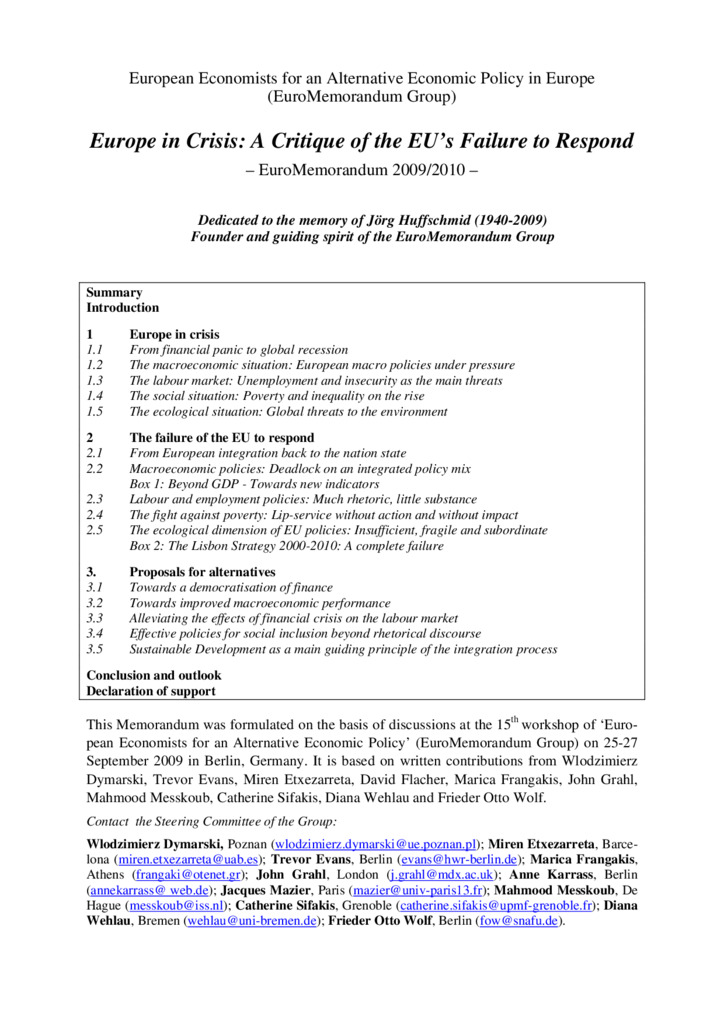 Europe in Crisis: A Critique of the EU’s Failure to Respond - Dedicated to the memory of Jörg Huffschmid (1940-2009), Founder and guiding spirit of the EuroMemorandum Group This Memorandum was formulated on the basis of discussions at the 15th workshop of ‘European Economists for an Alternative Economic Policy’ (EuroMemorandum Group) on 25-27 September 2009 in Berlin, Germany. It is based on written contributions from Wlodzimierz Dymarski, Trevor Evans, Miren Etxezarreta, David Flacher, Marica Frangakis, John Grahl, Mahmood Messkoub, Catherine Sifakis, Diana Wehlau and Frieder Otto Wolf. We have dedicated the EuroMemorandum 2009/10 to the memory of Jörg Huffschmid. The text is available in English, French, German, Greek, and Spanish. Source: EuroMemo Group
Europe in Crisis: A Critique of the EU’s Failure to Respond - Dedicated to the memory of Jörg Huffschmid (1940-2009), Founder and guiding spirit of the EuroMemorandum Group This Memorandum was formulated on the basis of discussions at the 15th workshop of ‘European Economists for an Alternative Economic Policy’ (EuroMemorandum Group) on 25-27 September 2009 in Berlin, Germany. It is based on written contributions from Wlodzimierz Dymarski, Trevor Evans, Miren Etxezarreta, David Flacher, Marica Frangakis, John Grahl, Mahmood Messkoub, Catherine Sifakis, Diana Wehlau and Frieder Otto Wolf. We have dedicated the EuroMemorandum 2009/10 to the memory of Jörg Huffschmid. The text is available in English, French, German, Greek, and Spanish. Source: EuroMemo Group -
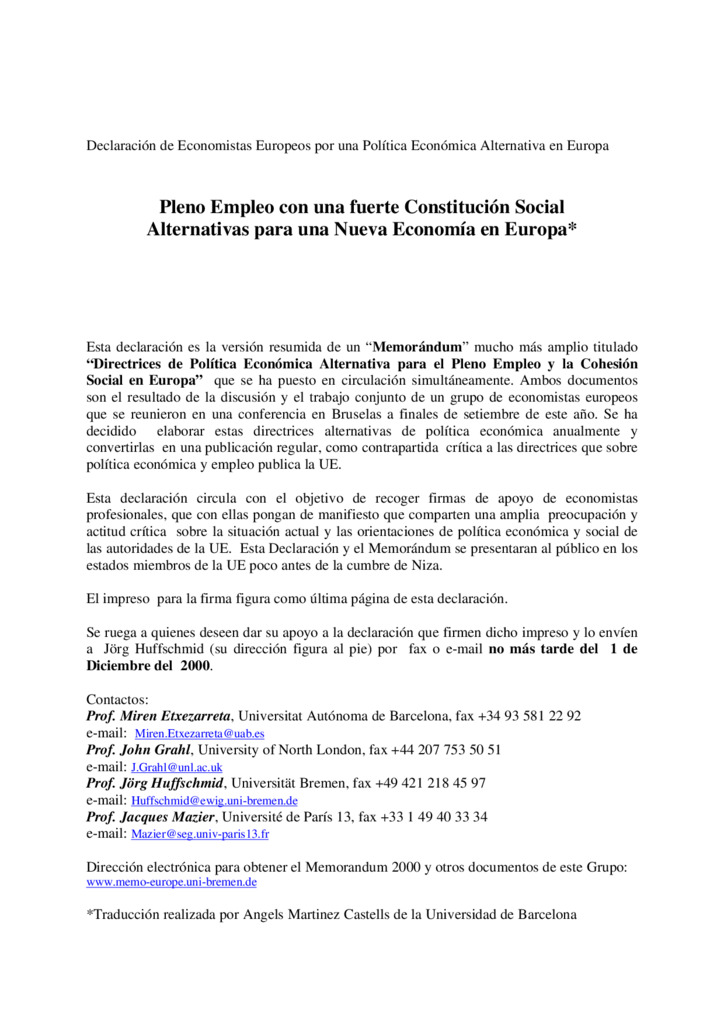 The text is available in English, French, German, Hungarian, Italian and Spanish. Additionally there is a long version in English and German available. Summary 1. Contrary to the very optimistic official presentations to the public, the economic and social situation in the EU must give rise to great concern: the current recovery is fragile, unemployment continues to remain at intolerably high levels, roughly four times the levels of the 1960s, and inequality in all forms is increasingly spreading all over Europe: inequality in income distribution, precarious working conditions, rising poverty, the persistent gender gap and the new dimension of inequalities between Eastern and Western Europe. 2. The economic and social policy of the European Union is criticised because of its uniquely narrow view and approach. On the macroeconomic side the exclusive fixation of monetary policy on price stability and the obsession of fiscal policy with budget deficit reduction have contributed to the current high level of unemployment and are likely to continue to do so in the future. At the same time social policy, under the heading of an "activating welfare state”, is reducing the social content of full employment, eroding social cohesion and solidarity, increasing inequality in many forms, while at the same time imposing more elements of compulsion and repression onto the weaker parts of society. 3. As an alternative to this regressive course of policy we propose - a more efficient and more democratic macroeconomic policy for sustainable growth and more socially rich employment on the way to full employment. Ways to this end are a more expansionary fiscal and a co-operative monetary policy as well as control over exchange rates and financial markets; - a stronger social policy with the aim of creating a social constitution which gives every individual living in the EU the unconditional right to a dignified life. Ways to this end are on the one hand measures to improve the conditions for progressive national policies and on the other hand specific European measures like the adoption of minimum standards for social expenditure in general and for specific purposes like health or child care in particular; - more balanced structural policies with particular emphasis on a more pragmatic view in competition policy, a stronger research and development policy, a strategic industrial policy, a better targeted regional and a more active trade policy; - a better and more determined preparation for Eastern enlargement: the completion of institutional reforms should be dropped as precondition for enlargement, generous transition periods should be negotiated for mutually sensitive areas, and transfer payments should be substantially enhanced in order to facilitate the accession. - The development of conceptions for a more radical restructuring of the economy and society, where not growth but welfare of the people is the central point of reference and individual and collective reproduction will be organised in new ways. Source: ·EuroMemo
The text is available in English, French, German, Hungarian, Italian and Spanish. Additionally there is a long version in English and German available. Summary 1. Contrary to the very optimistic official presentations to the public, the economic and social situation in the EU must give rise to great concern: the current recovery is fragile, unemployment continues to remain at intolerably high levels, roughly four times the levels of the 1960s, and inequality in all forms is increasingly spreading all over Europe: inequality in income distribution, precarious working conditions, rising poverty, the persistent gender gap and the new dimension of inequalities between Eastern and Western Europe. 2. The economic and social policy of the European Union is criticised because of its uniquely narrow view and approach. On the macroeconomic side the exclusive fixation of monetary policy on price stability and the obsession of fiscal policy with budget deficit reduction have contributed to the current high level of unemployment and are likely to continue to do so in the future. At the same time social policy, under the heading of an "activating welfare state”, is reducing the social content of full employment, eroding social cohesion and solidarity, increasing inequality in many forms, while at the same time imposing more elements of compulsion and repression onto the weaker parts of society. 3. As an alternative to this regressive course of policy we propose - a more efficient and more democratic macroeconomic policy for sustainable growth and more socially rich employment on the way to full employment. Ways to this end are a more expansionary fiscal and a co-operative monetary policy as well as control over exchange rates and financial markets; - a stronger social policy with the aim of creating a social constitution which gives every individual living in the EU the unconditional right to a dignified life. Ways to this end are on the one hand measures to improve the conditions for progressive national policies and on the other hand specific European measures like the adoption of minimum standards for social expenditure in general and for specific purposes like health or child care in particular; - more balanced structural policies with particular emphasis on a more pragmatic view in competition policy, a stronger research and development policy, a strategic industrial policy, a better targeted regional and a more active trade policy; - a better and more determined preparation for Eastern enlargement: the completion of institutional reforms should be dropped as precondition for enlargement, generous transition periods should be negotiated for mutually sensitive areas, and transfer payments should be substantially enhanced in order to facilitate the accession. - The development of conceptions for a more radical restructuring of the economy and society, where not growth but welfare of the people is the central point of reference and individual and collective reproduction will be organised in new ways. Source: ·EuroMemo -
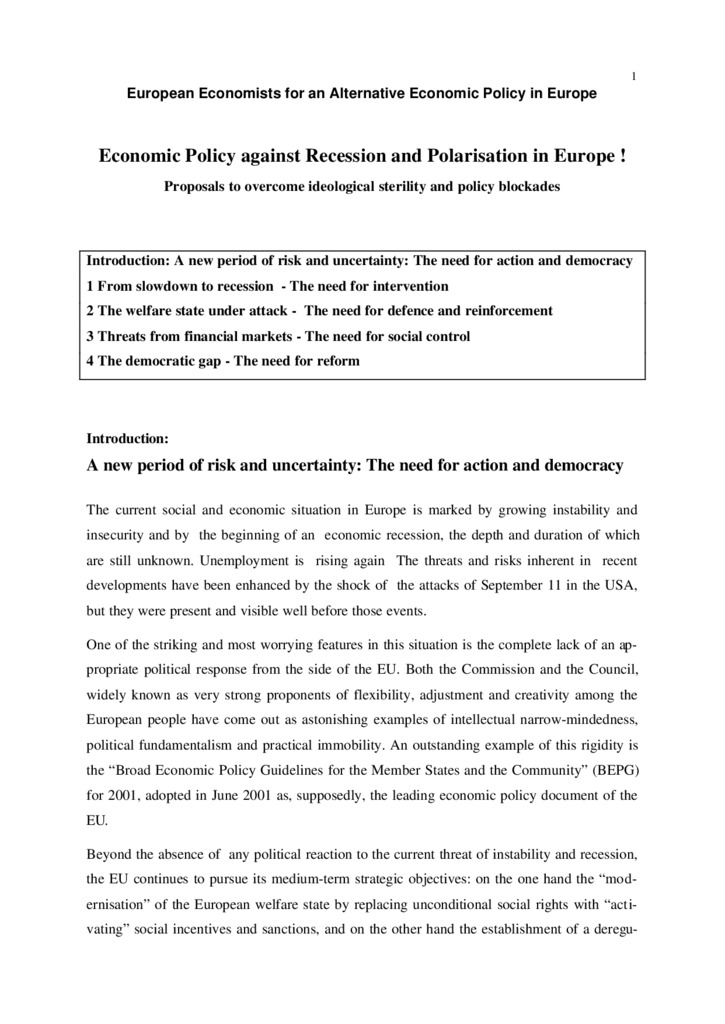 The text is available in English, French, German, Hungarian, Italian and Spanish. Additionally there is a short version in English, French, German, Hungarian, Italian and Spanish available Introduction: A new period of risk and uncertainty: The need for action and democracy 1 From slowdown to recession - The need for intervention 2 The welfare state under attack - The need for defence and reinforcement 3 Threats from financial markets - The need for social control 4 The democratic gap - The need for reform Source: EuroMemo Group
The text is available in English, French, German, Hungarian, Italian and Spanish. Additionally there is a short version in English, French, German, Hungarian, Italian and Spanish available Introduction: A new period of risk and uncertainty: The need for action and democracy 1 From slowdown to recession - The need for intervention 2 The welfare state under attack - The need for defence and reinforcement 3 Threats from financial markets - The need for social control 4 The democratic gap - The need for reform Source: EuroMemo Group -
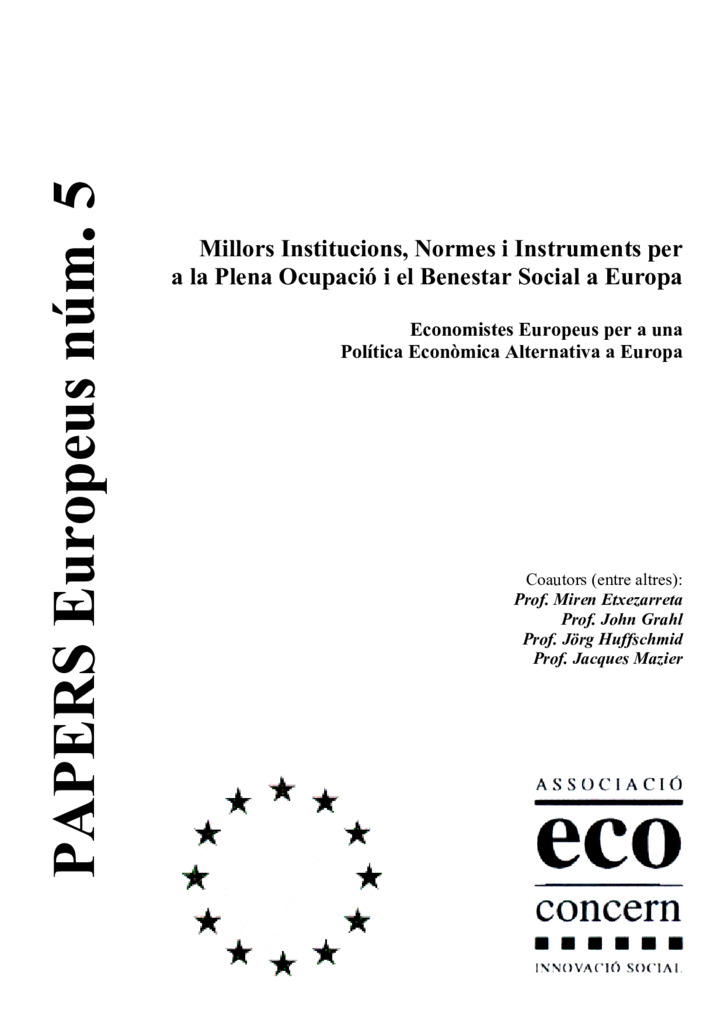 Millors Institucions, Normes i Instruments per per a la Plena Ocupació i el Benestar Social a EuropaThe text is available in Catalan, English, German, Hungarian, Italian and Spanish. Additionally there is a long version in German and English available. Summary 1. Self-Immunisation, False Optimism and Continued Austerity Amidst Growing Uncertainty: The Broad Economic Policy Guidelines (BEPG) 2002 2. The European Social Model - Cornerstones for an Alternative Economic Strategy in Europe 3. Eastern Enlargement - Challenge and Perspective for the European Social Model 4. Better Institutions, Rules and Tools for the European Social Model 4. 1. A framework for a more democratic and more efficient macroeconomic policy 4. 2. A stronger commitment to social welfare 4. 3. Reforming and Strengthening Public Services 4. 4. Enforcing the public interest in financial markets 5. Conclusion Soucer: EuroMemo
Millors Institucions, Normes i Instruments per per a la Plena Ocupació i el Benestar Social a EuropaThe text is available in Catalan, English, German, Hungarian, Italian and Spanish. Additionally there is a long version in German and English available. Summary 1. Self-Immunisation, False Optimism and Continued Austerity Amidst Growing Uncertainty: The Broad Economic Policy Guidelines (BEPG) 2002 2. The European Social Model - Cornerstones for an Alternative Economic Strategy in Europe 3. Eastern Enlargement - Challenge and Perspective for the European Social Model 4. Better Institutions, Rules and Tools for the European Social Model 4. 1. A framework for a more democratic and more efficient macroeconomic policy 4. 2. A stronger commitment to social welfare 4. 3. Reforming and Strengthening Public Services 4. 4. Enforcing the public interest in financial markets 5. Conclusion Soucer: EuroMemo -
 The text is available in English, French, German, Greek, Hungarian, Polish and Spanish. Additionally there is a long version in German and English available. Summary Introduction 1. In the face of stagnation, higher unemployment and social polarization - the need for an economic policy initiative 2. A more favourable economic policy framework to manage enlargement 3. More democracy and less Maastricht needed - Critique of the draft constitution 4. A strong public sector as a pillar of the European social model - Critique of the "Green Paper on Services of General Interest” 5. Broad Economic Policy Guidelines and Labour Market Policies Soucer: EuroMemo
The text is available in English, French, German, Greek, Hungarian, Polish and Spanish. Additionally there is a long version in German and English available. Summary Introduction 1. In the face of stagnation, higher unemployment and social polarization - the need for an economic policy initiative 2. A more favourable economic policy framework to manage enlargement 3. More democracy and less Maastricht needed - Critique of the draft constitution 4. A strong public sector as a pillar of the European social model - Critique of the "Green Paper on Services of General Interest” 5. Broad Economic Policy Guidelines and Labour Market Policies Soucer: EuroMemo -
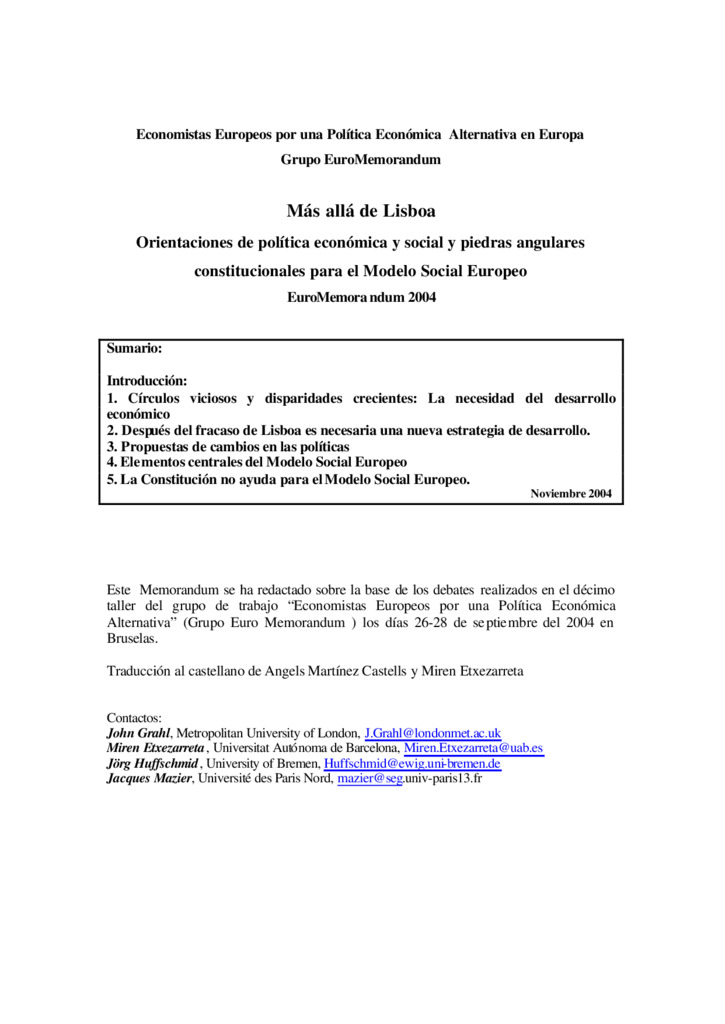 This Memorandum was formulated on the basis of discussions at the 10th workshop of the working group "European Economists for an Alternative Economic Policy” (Euro Memorandum Group) on September 26-28, 2004 in Brussels. The text is available in English, French, German, Hungarian, Italian, Polish and Spanish. Summary Introduction 1. Vicious circles and growing disparities: The need for economic development 2. After the failure of Lisbon: A new development strategy is necessary 3. Proposals for policy changes 4. Core elements of the European Social Model 5. The Constitution: Not helpful for the European Social Model Soucer: EuroMemo
This Memorandum was formulated on the basis of discussions at the 10th workshop of the working group "European Economists for an Alternative Economic Policy” (Euro Memorandum Group) on September 26-28, 2004 in Brussels. The text is available in English, French, German, Hungarian, Italian, Polish and Spanish. Summary Introduction 1. Vicious circles and growing disparities: The need for economic development 2. After the failure of Lisbon: A new development strategy is necessary 3. Proposals for policy changes 4. Core elements of the European Social Model 5. The Constitution: Not helpful for the European Social Model Soucer: EuroMemo -
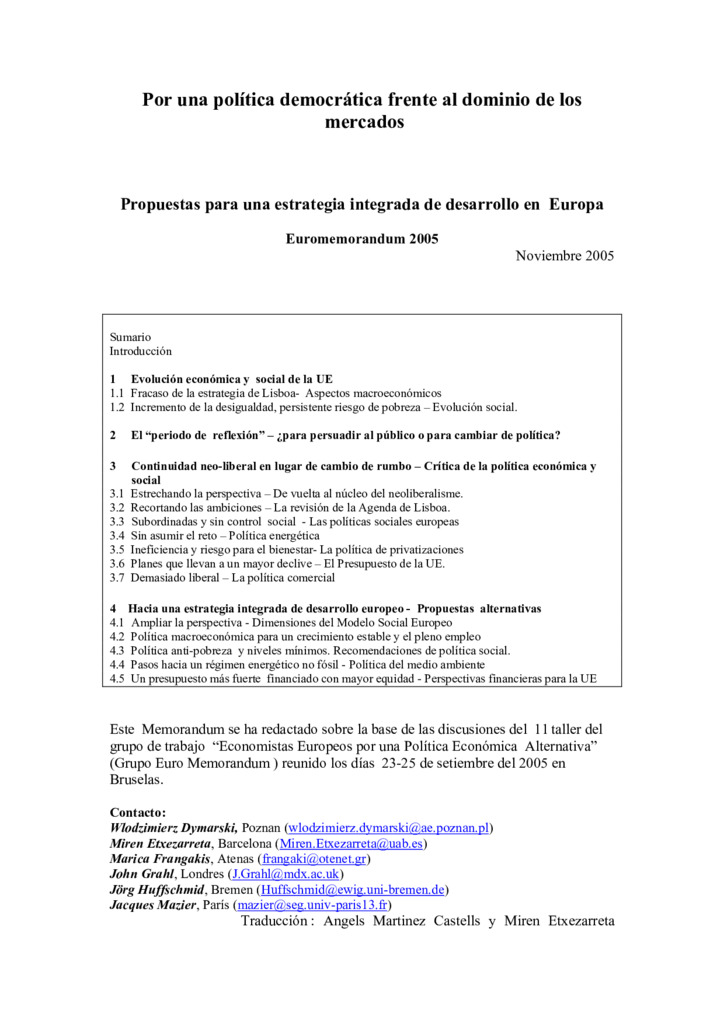 This Memorandum was formulated on the basis of discussions at the 11th workshop of the working group "European Economists for an Alternative Economic Policy” (Euro Memorandum Group) on September 23-25, 2005 in Brussels. The text is available in English, French, German, Greek, Hungarian, Italian, Polish and Spanish. Summary Introduction 1 Economic and social developments in the EU 1.1 Failure of the Lisbon strategy - Macroeconomic developments 1.2 Rising inequality, persistent risk of poverty - Social developments 2 The "period of reflection” - for public persuasion or for a change in policy? 3 Neo-liberal continuity instead of correction - Critique of economic and social policy 3.1 Narrowing the perspective - Back to the core of neo-liberalism 3.2 Curtailed ambitions - The review of the Lisbon Agenda 3.3 Subordinated and without social control - European social policies 3.4 Missing the challenge - Energy policy 3.5 Inefficient and risky for welfare - Privatisation policy 3.6 Counterproductive plans for further decline - The EU Budget 3.7 Too liberal - Trade policy 4 Towards an integrated European development strategy - Proposals for alternatives 4.1 Broadening the perspective - Dimensions of the European Social Model 4.2 Macroeconomic policy for sustainable growth and full employment 4.3 Anti-poverty policy and minimum standards - Social policy recommendations 4.4 Steps towards a non fossil energy regime - Environmental policy 4.5 A stronger budget with more equitable financing - Financial perspectives for the EU Soucer: EuroMemo
This Memorandum was formulated on the basis of discussions at the 11th workshop of the working group "European Economists for an Alternative Economic Policy” (Euro Memorandum Group) on September 23-25, 2005 in Brussels. The text is available in English, French, German, Greek, Hungarian, Italian, Polish and Spanish. Summary Introduction 1 Economic and social developments in the EU 1.1 Failure of the Lisbon strategy - Macroeconomic developments 1.2 Rising inequality, persistent risk of poverty - Social developments 2 The "period of reflection” - for public persuasion or for a change in policy? 3 Neo-liberal continuity instead of correction - Critique of economic and social policy 3.1 Narrowing the perspective - Back to the core of neo-liberalism 3.2 Curtailed ambitions - The review of the Lisbon Agenda 3.3 Subordinated and without social control - European social policies 3.4 Missing the challenge - Energy policy 3.5 Inefficient and risky for welfare - Privatisation policy 3.6 Counterproductive plans for further decline - The EU Budget 3.7 Too liberal - Trade policy 4 Towards an integrated European development strategy - Proposals for alternatives 4.1 Broadening the perspective - Dimensions of the European Social Model 4.2 Macroeconomic policy for sustainable growth and full employment 4.3 Anti-poverty policy and minimum standards - Social policy recommendations 4.4 Steps towards a non fossil energy regime - Environmental policy 4.5 A stronger budget with more equitable financing - Financial perspectives for the EU Soucer: EuroMemo -
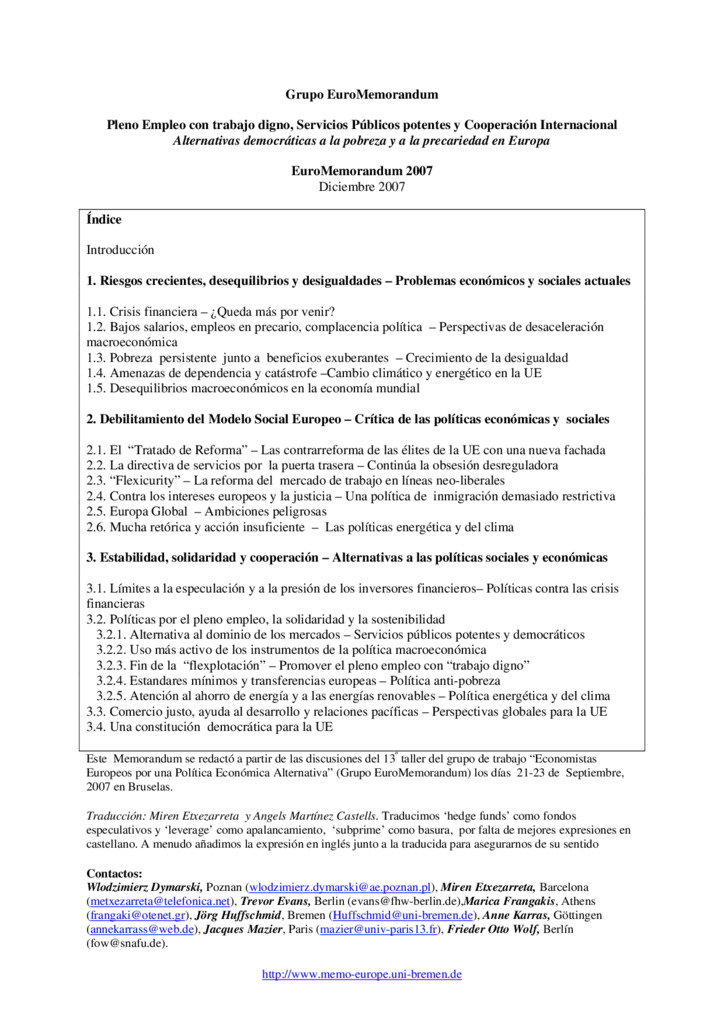 This Memorandum was formulated on the basis of discussions at the 13th workshop of the working group "European Economists for an Alternative Economic Policy” (EuroMemorandum Group) on September 21 - 23, 2007 in Brussels. The text is available in English, French, German, Greek, Hungarian and Spanish. Summary Introduction 1. Enhanced risks, imbalances and inequalities - Current economic and social problems 1.1. Financial crisis - More to come? 1.2. Low wages, precarious jobs, political complacency - Prospects for macro-economic decline 1.3. Persistent poverty amidst exploding profits - Inequality on the rise 1.4. Threats of dependence and catastrophe - Energy and climate change in the EU 1.5. Macroeconomic imbalances in the world economy 2. Undermining the European Social Model - Critique of economic and social policies 2.1. The "Reform Treaty” - The EU elites’ counter-reform under a new cover 2.2. Service directive through the backdoor - The deregulatory obsession continues 2.3. "Flexicurity” - Labour market reform with a neo-liberal bias 2.4. Against European interests and fairness - Too restrictive immigration policy 2.5. Global Europe - Threatening ambitions 2.6. Too little action behind the rhetoric - Climate and energy policies 3. Stability, solidarity and cooperation - Alternatives for economic and social policies 3.1. Limits for speculation and financial investor pressure - Policies against financial crises 3.2. Policies for full employment, solidarity and sustainability 3.2.1. Alternative to the dominance of markets - Strong and democratic public services 3.2.2. More active use of macroeconomic policy tools 3.2.3. End "flexploitation” - Promote full employment with "good work” 3.2.4. Minimum standards and European transfers - Anti-poverty policy 3.2.5. Focus on energy saving and renewables - Climate and energy policies 3.3. Fair trade, development aid and peaceful relations - Global perspectives for the EU 3.4. A democratic constitution for the EU Soucer: EuroMemo
This Memorandum was formulated on the basis of discussions at the 13th workshop of the working group "European Economists for an Alternative Economic Policy” (EuroMemorandum Group) on September 21 - 23, 2007 in Brussels. The text is available in English, French, German, Greek, Hungarian and Spanish. Summary Introduction 1. Enhanced risks, imbalances and inequalities - Current economic and social problems 1.1. Financial crisis - More to come? 1.2. Low wages, precarious jobs, political complacency - Prospects for macro-economic decline 1.3. Persistent poverty amidst exploding profits - Inequality on the rise 1.4. Threats of dependence and catastrophe - Energy and climate change in the EU 1.5. Macroeconomic imbalances in the world economy 2. Undermining the European Social Model - Critique of economic and social policies 2.1. The "Reform Treaty” - The EU elites’ counter-reform under a new cover 2.2. Service directive through the backdoor - The deregulatory obsession continues 2.3. "Flexicurity” - Labour market reform with a neo-liberal bias 2.4. Against European interests and fairness - Too restrictive immigration policy 2.5. Global Europe - Threatening ambitions 2.6. Too little action behind the rhetoric - Climate and energy policies 3. Stability, solidarity and cooperation - Alternatives for economic and social policies 3.1. Limits for speculation and financial investor pressure - Policies against financial crises 3.2. Policies for full employment, solidarity and sustainability 3.2.1. Alternative to the dominance of markets - Strong and democratic public services 3.2.2. More active use of macroeconomic policy tools 3.2.3. End "flexploitation” - Promote full employment with "good work” 3.2.4. Minimum standards and European transfers - Anti-poverty policy 3.2.5. Focus on energy saving and renewables - Climate and energy policies 3.3. Fair trade, development aid and peaceful relations - Global perspectives for the EU 3.4. A democratic constitution for the EU Soucer: EuroMemo
